During the latter 1980s, while the punk scene was maturing on the east side of the DFW Metroplex, a similarly loud, aggressive music scene was developing in parallel to it over on the west side. Dallas had its iconic, punk focused venues such as the Honest Place, the Hot Klub, Studio D, and the succession of venues to call 2111 Commerce Street home. Likewise, Fort Worth and environs had their own metal focused clubs such as Rascals, the Tombstone Factory, and Joe's Garage. These two scenes didn't exist in a vacuum, of course, and there was plenty of crossover between them (the Silver Dollar Rock Shop was located in Dallas, for example, and Fort Worth-based Rigor Mortis was famously managed and guided to a record deal by Jeff Liles, who once booked shows for the Theatre Gallery in Deep Ellum). But, musically and spiritually speaking, the early DFW metal scene was based mostly on the west side of town. The aforementioned Rascals, Tombstone Factory, and Joe's Garage will be subjects of future installments in this series, but sprinkled among these iconic venues were a number of smaller, less remembered haunts that also called the areas west of Dallas home. What were some of these, and what (if anything) remains of them today? In this installment of "Ghosts of DFW Music History," we'll take a look at four of them.
DLP Studios
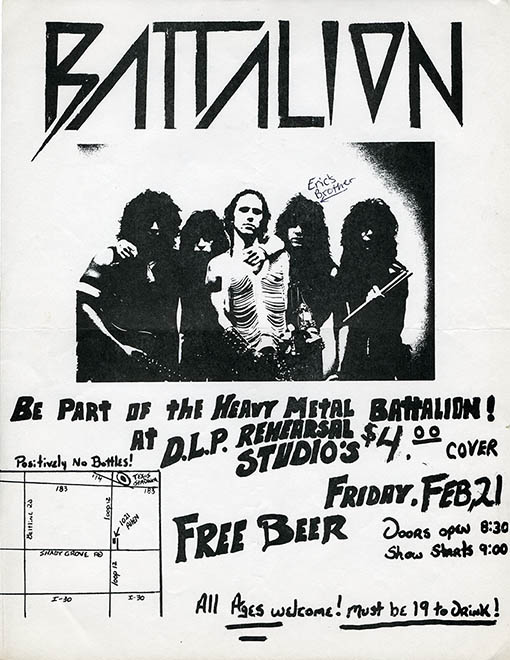
Information on the studio building is scant, but what is certain is that for a period of time in the mid-1980s it served as a rehearsal space and sometime performance venue. Warlock and Rigor Mortis are known to have participated in a "battle of the bands" held at DLP. Arlington-based band ACCESS recorded live performance footage at DLP for a submission to MTV's "Basement Tapes" underground music show. Members of Pantera are even said to have visited the facility at least once, and The Scorpions (yes, those Scorpions of "Wind of Change" fame) supposedly rented space at DLP in preparation for one of their American tours. By the late 1980s, DLP would move to a different location a short distance away from Allen Street, and from that point onward its history seems lost to time, at least as far as what's available online or in local public records. Tax records show a filing date of February 21, 1985 for the original Irving location, so it doesn't appear to have been terribly long-lived. In any case, it was in operation long enough for Rigor Mortis to bestow upon it a "fuck you" shout-out in the liner notes to their 1986 demo release.
What did DLP stand for? According to Scott Black, a musician who used to practice at the studios and who allegedly heard straight from the owner's mouth, it stood for "David Lee Party."
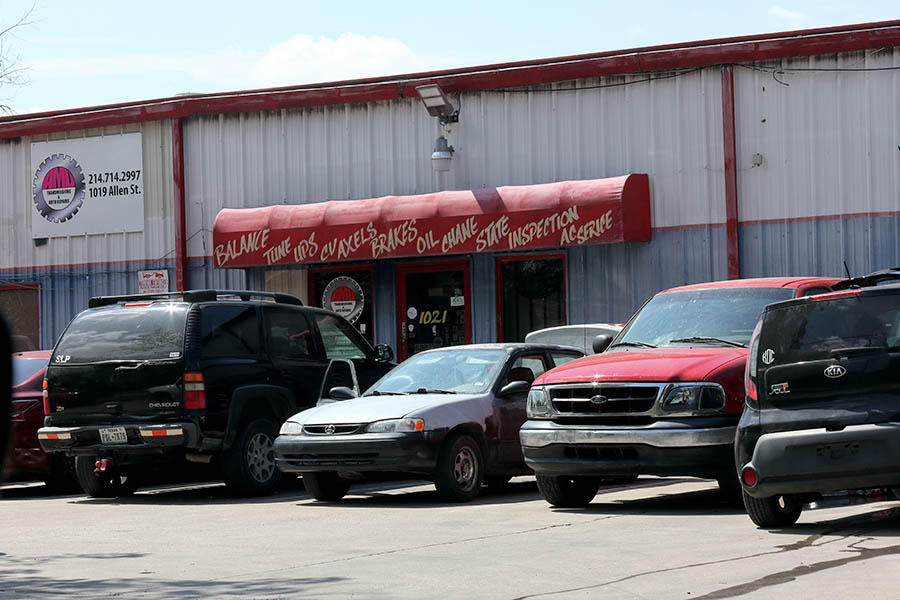
Machinist Hall
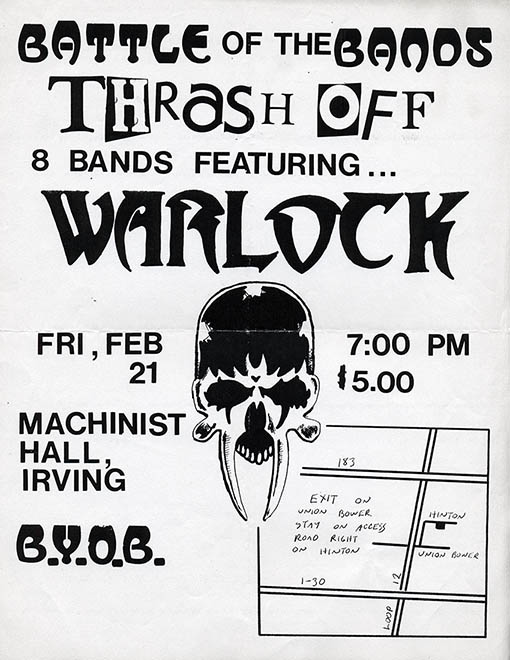
It is perhaps no surprise that the old Machinist Hall was repurposed as a venue for local music. It offered over 9,000 square feet of available space with an additional outdoor area available for parking. The location off a major highway was convenient, and the building and its campus were far enough away from the Deep Ellum punk hub to realistically appeal to the more metal-oriented crowd. And, like so many other early (and even present-day) performance venues, it was situated in an industrial district, which made its use for underground metal that much more fitting. Its virtues were clearly enough to catch the attention of local music legend Jerry Warden of KNON, who saw its potential and went on to book a good many shows at the venue. Step inside one of these, and you could dive full throttle into the musical ferocity of Arsenal, the bone crushing riffs of Eldritch Rite or Talon, or experience Warden's own band Warlock (aka Warlock Texas), who featured with the other bands on most of those nights. One notable show from January 1986 featured major label acts Metal Church and Omen, with Warlock serving as the opening act.
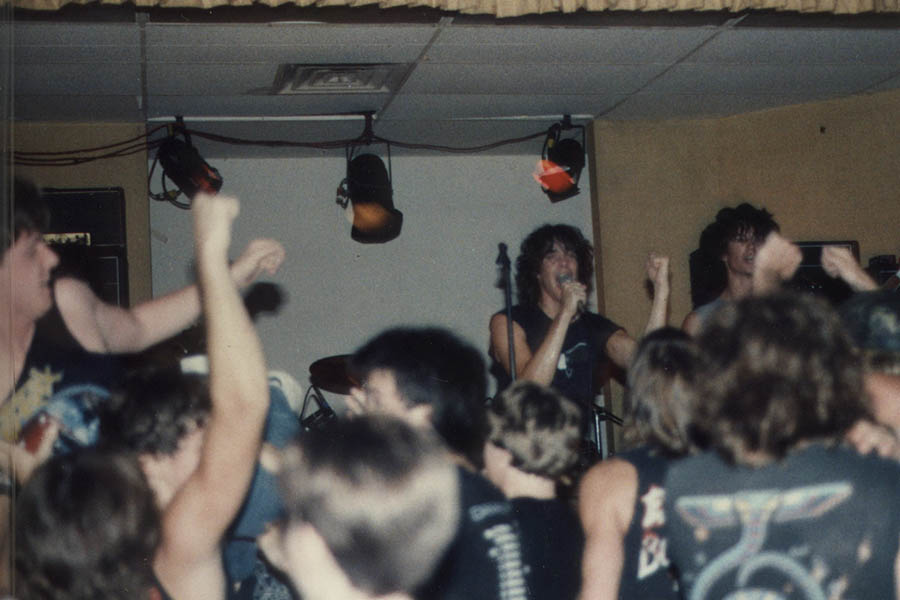
Unfortunately, there is precious little to be found in historical records about Machinist Hall. Search online for the names of acts who took the stage there and you'll find virtually nothing outside of the Metal Church/Omen show. A similarly named venue in Rancho Cordova, California may throw up a false positive or two, but those are little more than red herrings. To find out anything at all, you have to talk to people who were part of the music scene during the time of the Hall's glory days. Then you can hear some interesting anecdotes about the place, such as a story involving friends of local band Talon driving their motorcycles onto the stage during a 1985 show. Talon's vocalist was Turner Scott Van Barclum, a part-time bouncer infamous for having punched Kurt Cobain during a 1991 appearance by Nirvana at Trees.
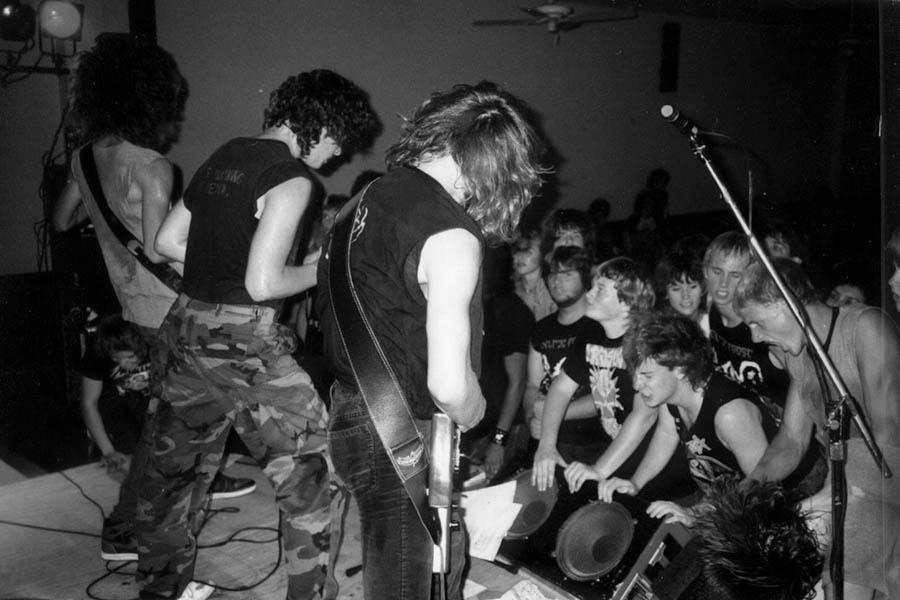
Today, the building at 1930 Hinton Drive remains an unlikely artifact of the metal scene to which it once bore witness. The building and its lot sit inconspicuously at the end of a road mostly given over to other industrial structures and manufacturing sites. Given its former utilization as an event hall, I can't help but wonder how much use it ever got as a meeting place for actual machinists. My attempts to research this came up mostly empty, save for a 1997 reunion gathering of former employees of the defunct Murdock Machine and Engineering Company. The International Association of Machinists and Aerospace Workers (IAMAW, or IAM as used in this context) is one of the largest labor unions in North America. That being said, there's seemingly nothing to be found about what they themselves actually did at the building. Perhaps none of it was particularly noteworthy, at least not as noteworthy as the crowds who once thronged the stage for a dose of 1980s metal mania.
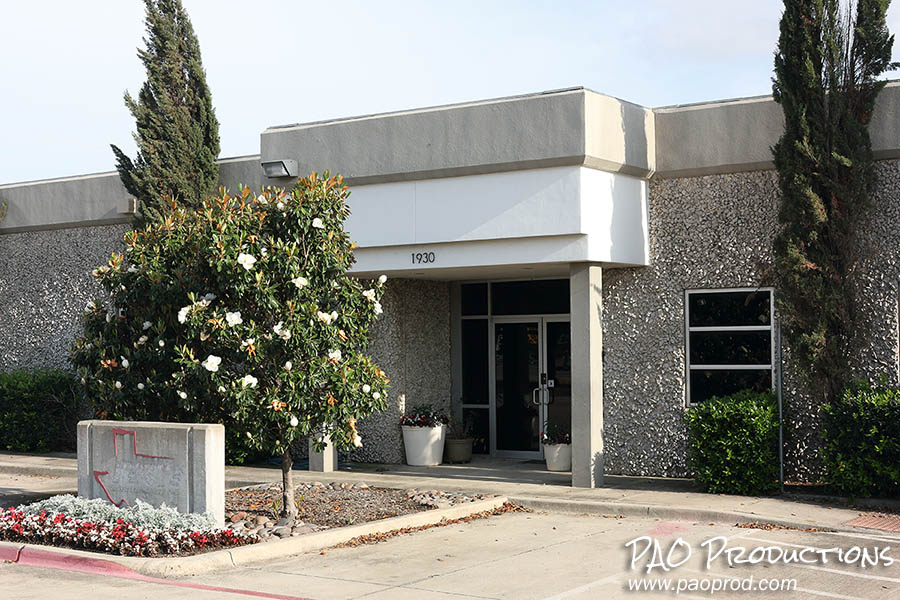
Metal Works
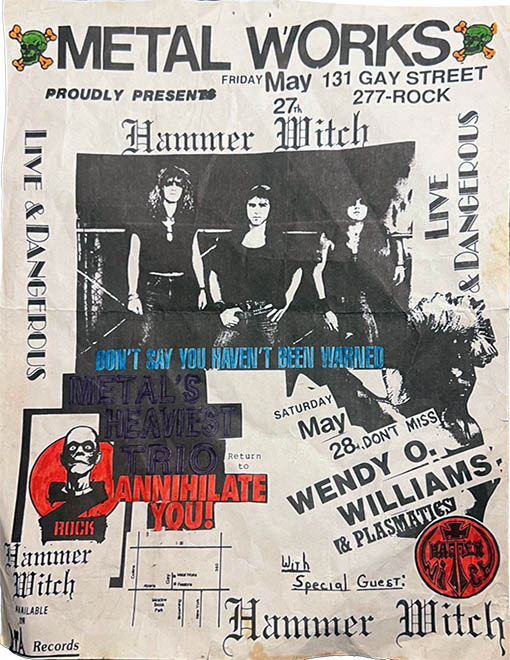
As stated in the intro, the Arlington/Fort Worth region of the DFW Metroplex had its iconic venues, chief among them Rascals, the Tombstone Factory, and Joe's Garage. Less remembered, and rarely (if ever) spoken of today, was Metal Works. James Craven owned the place at 131 Gay Street where a regular crowd of metalheads was known to congregate, where hometown heroes Pantera made regular appearances, and where a young Darrell Abbott was known to hang out and mingle. Obvious jokes about the street name aside, Metal Works helped carry the torch for homegrown metal in the DFW area during a time when it was really coming into its own. But before the metal came to Metal Works, the groundwork for it was laid by a long succession of earlier outfits that also occupied the space on Gay Street. Each of these brought the spirit of the venue ever closer to that which would come to define it during a brief period in the late 1980s.
The earliest extant reference to 131 Gay Street as a music venue appears to have been made via the Fort Worth Star-Telegram, in which a 1962 announcement advertised the Powerhouse 4 Banjo Band at the Crestview Club. By August of 1964, the venue had been rechristened Penny's Crestview Lounge (or, alternately, just the Crestview Lounge), and hosted dance acts such as the Arnie French Combo and the Dave Howard Quartet. As of 1969, the place was being advertised as The Country Spot, and by 1977 it was the Whiz Discotheque, open Tuesday through Sunday from 5 PM until 2 AM with a light up dance floor and a cover of $1 or $2 depending on the night and patron's sex. This gave way by 1981 to Cin's, "Arlington's newest rock 'n roll night club," open seven days a week with no cover. Advertisements from the time suggest that live bands were booked for three night stints running from Thursday through Saturday night. Finally, by 1982, 131 Gay Street had become the home of the Rock Haven Club. The Rock Haven continued the tradition of booking bands for three night engagements, showcasing a wide variety of rock acts which included a few notables such as Warlock, Impulse, and Blackhorse. Scores of others would take the stage from 1984-1987, bands with names such as Elixir, Nightwing, Sudden Impact, Rex Havoc, White Tiger, The Source, Double Ace, and even Uncle Dickies Shameless Quickies. The scene was cash only with the dress code enforced, and the dance floor was apparently hopping. The stage was set for the emergence of Metal Works.
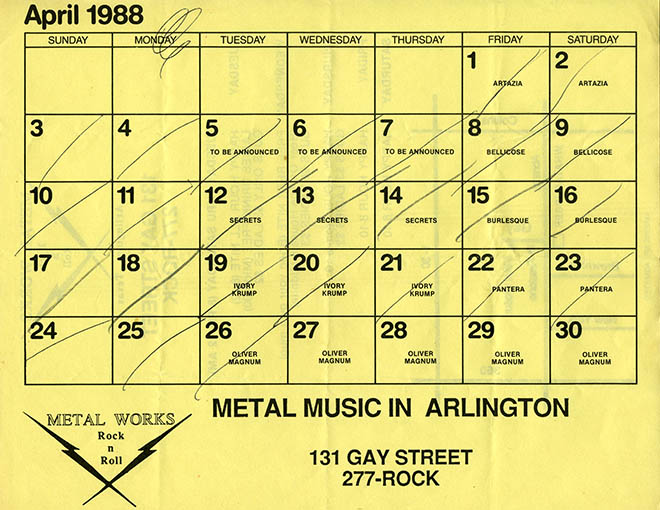
The first Metal Works show to come up in my research took place on October 23, 1987, part of a "grand opening" weekend featuring Pantera as the first headline act. The inaugural roster of performers drew from the "who's who" of the local metal scene, with the opening weekend being succeeded by others featuring Assassin, Strutter, and Hammer Witch. Pantera would again be called upon to play the weekend of December 10-12, and once again for New Year's Eve, supported by another local act called Katt Daquiri. Katt Daquiri would be a long-running fixture of the Metal Works scene, playing - according to drummer Ray Bolander - 151 shows over a period of about two years as the nightly opening act. The dress was casual and the club was all ages, and the typical cover was seven to ten dollars whenever a band was playing. According to Renee Wooley, a Metal Works regular, "The place was real casual, 'anything goes' from shorts to full metal jacket to Manscara. There were big round tables in the middle and old school bleachers against the walls. You had to go through the DJ booth to get backstage and it was pretty crappy but we had several birthday parties back there." Capacity was around 200 people, but twice as many might find themselves squeezed inside on a good night. Rita Haney was behind the bar and the times were good. And if an act failed to show, a few strategic calls would be made and someone would be brought in for an impromptu acoustic set.
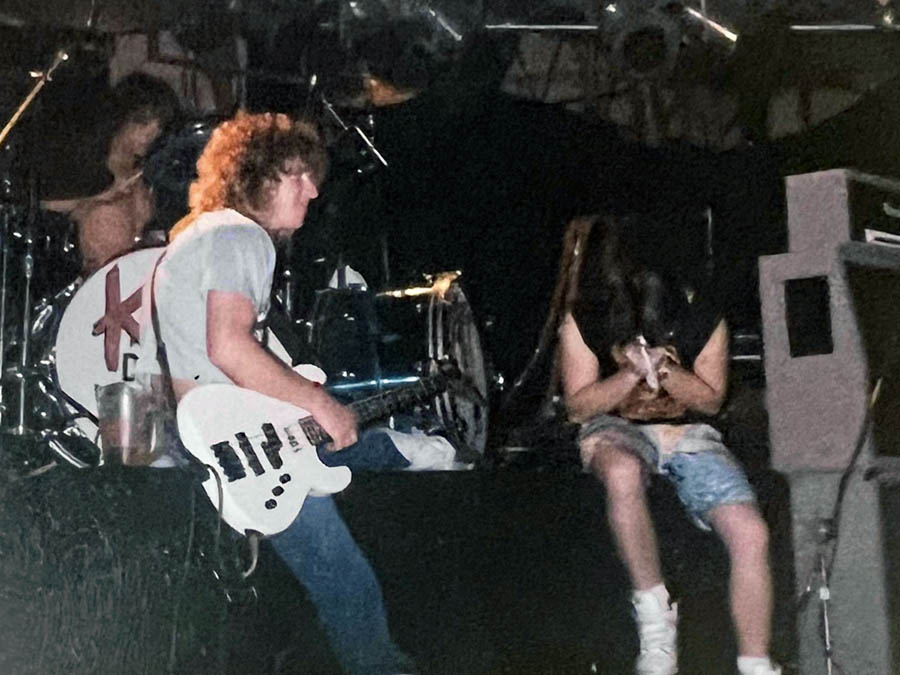
Ultimately, as was the case with so many other small, mom and pop style businesses to have closed their doors, the days of Metal Works were short-lived. The club would eventually succumb to the same affliction that took out the myriad of earlier venues that had called 131 Gay Street home, apparently closing for good sometime in 1989 from what I can tell (in early 1990, the Fort Worth Star-Telegram reported a new application having been filed with the TABC for the former Metal Works space, seeking a mixed beverage and late hours permit for a venue to be called Coyote Connection). Renee Wooley fondly recalls an occasion where Vinnie Paul of Pantera joined forces with members of Katt Daquiri on guitars and bongos, while "Diamond" Darrell performed skateboarding tricks onstage. But despite the regular presence of area luminaries such as the Abbott brothers, Metal Works seems to have fallen into something of a historical black hole, rarely discussed in the same breath (or, in fact, at all) as venues such as Joe's Garage and Dallas City Limits among the old-timers in the scene. The club's run is said to have been bookended by Katt Daquiri, who apparently played both the club's first ever show and its last ever one, which strikes me as very fitting.
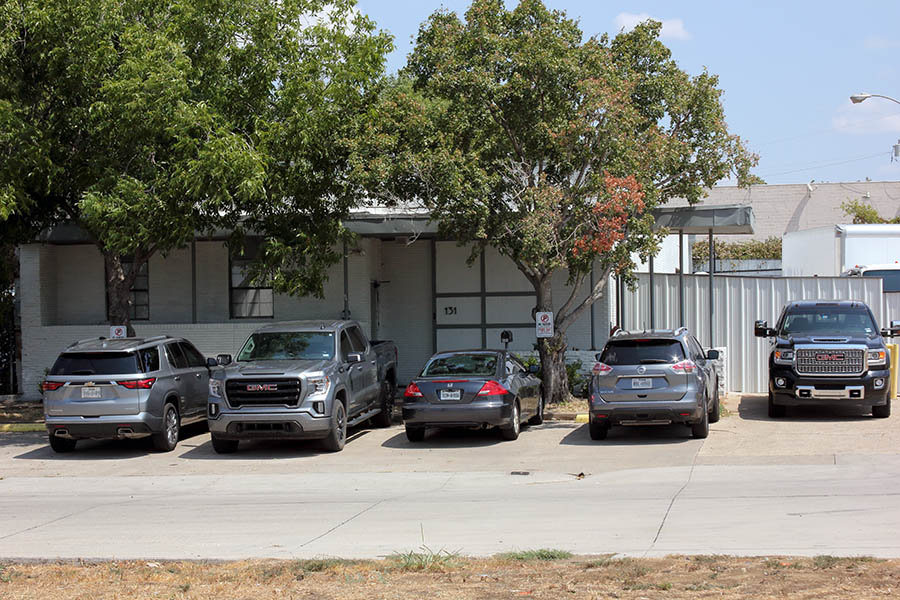
BC's, aka BC's Teen Club
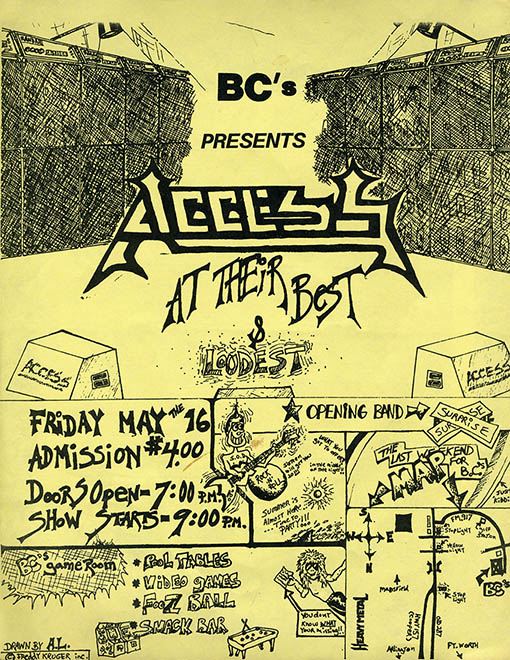
"Take Cooper south until it curves right into 287, take a left, take 287 to FM 917, take a right, follow road left around curve, road will straighten out, follow it until you see a lit BC's sign on the right hand side." Those directions, and others very much like them, provided a verbal map to a hidden treasure nestled deep in the rural outskirts of Mansfield, far from the howlings of Deep Ellum and the geographically distant anchors of the metal scene in Fort Worth and Arlington. The flyers held the promise of good times to be had, as long as you were willing to make the drive.
Information on BC's is challenging to come by in the 21st century. Extant copies of flyers are scarce, and when they are obtained, most of them feature maps and directions that can't be used to find the exact original location today. There is little to no mention of the club in discussion groups or online forums, no old newspaper articles to be found in library archives, almost nothing to dig through even with the most determined, in-depth search engine queries online. But the club did exist despite this lack of digital evidence. Drive down U.S. 287 Business to Heritage Pkwy, and take Heritage Pkwy (aka FM 917) west and south for about 3 1/2 miles to just past the intersection with Hudson Drive (FM 616), and you will arrive at the one time center for local metal on the very far south end of the DFW Metroplex.
Making its home in the extreme northeastern portion of Johnson county, BC's was an all ages club whose "B" and "C" were derived from the initials of its two business partners. On the outside, one would find an largely isolated building largely surrounded by fields. On the inside, one would find a hangout center with not only a performance stage but also a snack bar and game room. Show flyers regularly advertised door prizes, pool tables, fooz ball, a video game arcade, and, of course, heavy metal. On Friday and Saturday nights, the doors would open at 7 PM (or, on at least one occasion, 8 PM), with ticket prices appearing to run $4 apiece. And although the venue was styled on at least one flyer as a teen club, BC's attracted its fair share of adult patrons as well. According to ACCESS guitarist Gary Christopher, whose father was the "C" in BC's, it was in fact the place parents didn't want their kids to go, being a metal club with "lots of people banging heads and getting stoned in the parking lot." Groups known to have played, or at least been engaged to play, at BC's include Ardent/Détente, Forced Entry, Triple Axxx, Stygian, Montage, Battalion, and, most notably, ACCESS.
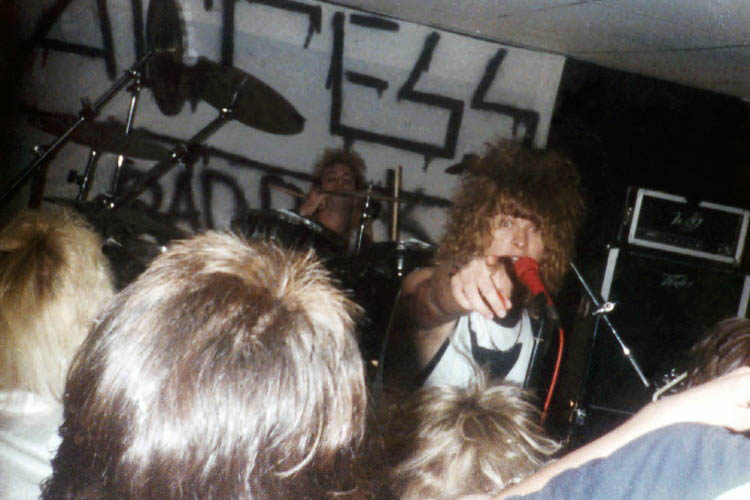
ACCESS's history as a band is inseparably intertwined with that of BC's due to the family connection, with the venue serving as a veritable home base for the band during its run. ACCESS (all caps is the proper styling of the name per bassist Tony Bradford), active from 1985 to 1986, played other venues such as DLP Studios, but they appeared most regularly at the rural venue on the outskirts of Mansfield - in fact, every flyer I've ever seen for BC's spotlights the band. Alongside the aforementioned Gary Christopher and Tony Bradford, the band's lineup included John Webb (aka "Webbster") on drums and the late Chris Westbrook on vocals and guitar. In 1986, the band called it quits, and from that date onward there is precious little information to be found pertaining to BC's. When my friend and I first attempted to identify the old building, we couldn't find anyone in nearby Mansfield who knew anything about the place.
Today, the former BC's lives on as an auto repair shop, with only a smattering of glitter and paint on the walls recalling its long gone life as a metal club. Satellite images confirm the surrounding area to be quite a bit more developed today, but the area still retains much of its rural character. FM 917 itself is as rural as it ever was, still only two lanes wide with a yellow stripe down the middle. And Mansfield's ersatz metal haven is long gone save for the memories of those who were a part of it.
(In memory of Richard Christopher and Chris Westbrook)
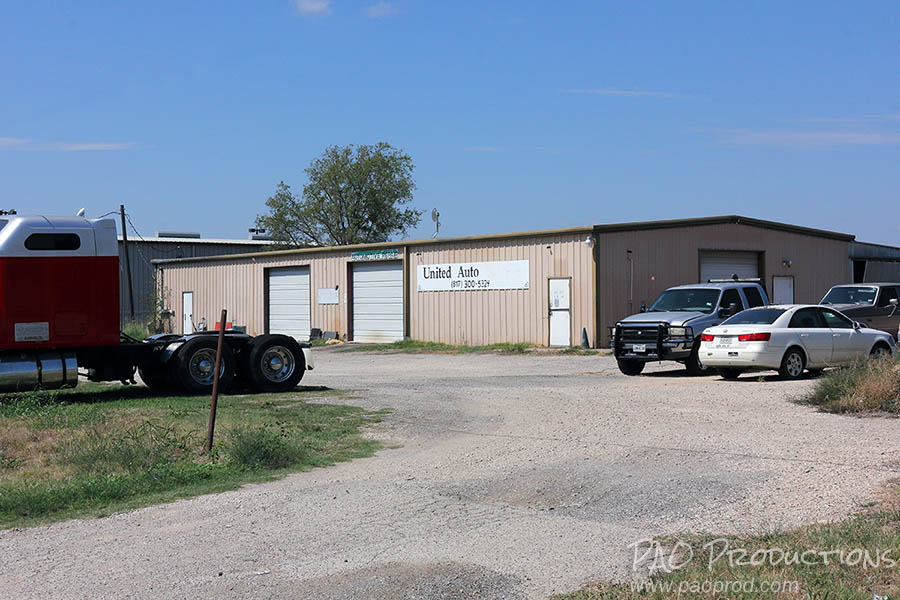
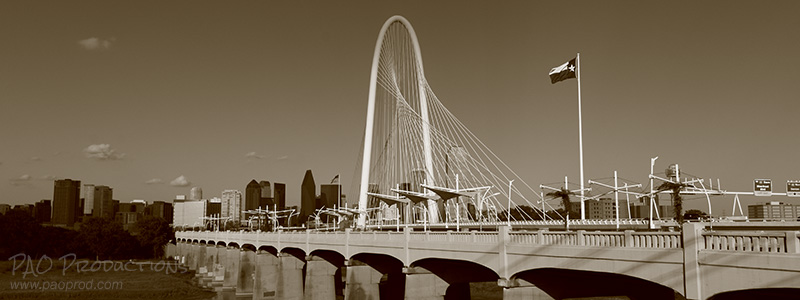
I love this! Thanks for including me‼️‼️🤘🏼🤘🏼
Another great article! Good job Peter!
Wonderful article. Thanks Peter for letting me contribute and participate in a small way to celebrate one of the best periods of music in DFW history.